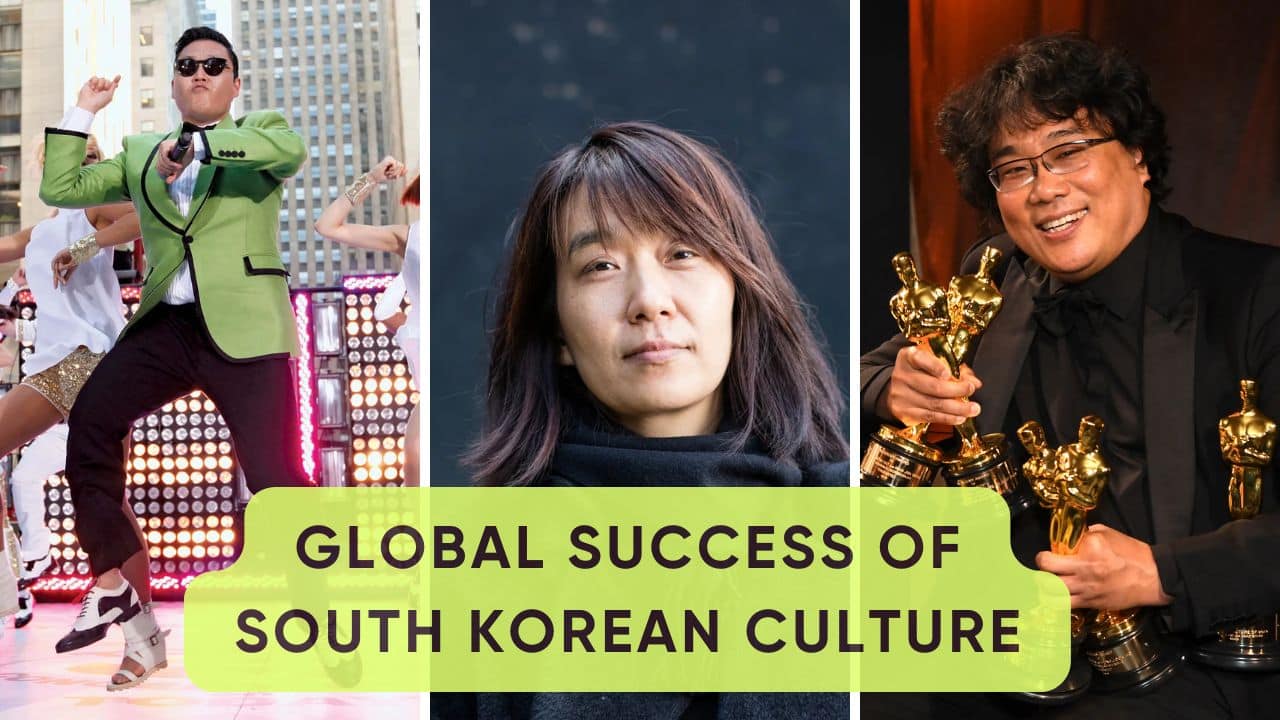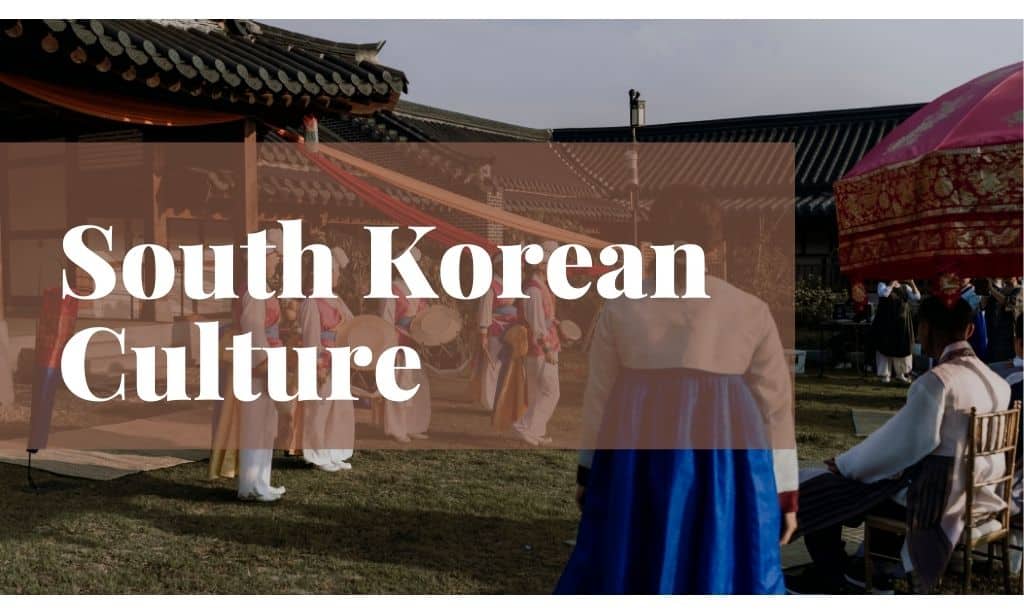South Korean culture has become a dominant force on the global stage, captivating audiences worldwide with its unique blend of tradition and modernity. From the infectious rhythms of K-pop to the compelling narratives of TV series like “Squid Game” and the cinematic brilliance of “Parasite,” South Korea’s cultural exports are leaving an indelible mark across continents.
The recent Nobel Prize win by acclaimed author Han Kang further cements South Korea’s position as a powerhouse of cultural innovation and excellence.
In this article, we will look into the global success of South Korean culture in terms of literature, K-pop, K-dramas, and more.
Recent Global Success of South Korean Culture
South Korean culture has taken the world by storm in recent years, achieving remarkable success across various entertainment sectors. K-pop groups like BTS and Blackpink have dominated global music charts, while Korean dramas such as “Squid Game” have broken streaming records on platforms like Netflix.
The film industry has also made significant strides, with Bong Joon-ho’s “Parasite” becoming the first non-English language film to win the Academy Award for Best Picture.This cultural phenomenon, known as “Hallyu” or the “Korean Wave,” has not only captivated international audiences but also significantly boosted South Korea’s economy.
In 2022, cultural exports were valued at $13.2 billion, surpassing traditional sectors like home appliances and electric cars. The government aims to increase this figure to $25 billion by 2027, highlighting the growing importance of cultural exports as a key economic driver.The global appeal of South Korean culture extends beyond entertainment, influencing fashion, beauty, and cuisine worldwide.
This cultural soft power has enhanced South Korea’s global image and diplomatic influence, making it a formidable player in the international arena.
Han Kang: A Literary Luminary
Han Kang’s Nobel Prize in Literature is a testament to the profound impact of South Korean literature on the global literary landscape. Although she wasn’t initially a frontrunner for the 2024 Nobel Prize, her victory underscores a broader trend of increasing international recognition for South Korean authors.
Han Kang first garnered international acclaim in 2016 when her novel “The Vegetarian” won the Man Booker International Prize. This novel, originally published in 2007, delves into themes of personal freedom and societal norms and resonates deeply with a global audience.
The success of “The Vegetarian” was not solely Han Kang’s achievement; it was also shared with her translator, Deborah Smith, whose exceptional translation work made the novel accessible to English-speaking readers. Smith’s contribution was pivotal in introducing more South Korean literature to the Western world, leading her to establish Tilted Axis Press.
This non-profit British publishing house focuses on contemporary Asian literature, providing a platform for diverse voices and stories that might otherwise remain unheard.
Han Kang’s literary journey did not stop there. In 2023, she won France’s Prix Médicis for foreign literature with her latest novel, “We Do Not Part,” which is slated for an English release in 2025. This continued success highlights her ability to explore complex human emotions and societal issues with depth and sensitivity, making her works resonate universally.
Emerging Voices in South Korean Literature
Han Kang is not the only South Korean author making waves internationally. Bora Chung, with her short story collection “Cursed Bunny,” was shortlisted for the International Booker Prize in 2022, showcasing her talent for blending dark humor with poignant social commentary.
Kim Young-ha earned the Deutscher Krimi Preis (German Crime Fiction Prize) in 2020 for his novel “Diary of a Murderer,” marking him as a significant figure in crime fiction. Additionally, Cho Nam-joo’s novel “Kim Ji-young, Born 1982” has been translated into over 18 languages, reflecting the global appetite for stories that delve into gender dynamics and societal expectations.
These authors, among others, contribute to a rich and diverse literary scene that challenges readers to engage with South Korean society’s nuances and complexities. Their international recognition not only elevates South Korean literature but also fosters a deeper understanding and appreciation of its cultural narratives.
K-Pop and Entertainment: The Heart of Hallyu
While literature plays a significant role, South Korea’s K-pop and entertainment industries are arguably the most visible and influential aspects of the Hallyu (Korean Wave). Groups like BTS and Blackpink have achieved unprecedented global success, breaking records on international charts and amassing millions of dedicated fans worldwide.
These artists are not just musicians; they are cultural ambassadors who bring South Korean fashion, language, and trends to a global audience.
The Evolution of K-Pop
K-pop’s rise to global prominence is a story of meticulous planning, strategic marketing, and relentless dedication. The idol training system employed by major entertainment companies like YG Entertainment, SM Entertainment, and JYP Entertainment is a cornerstone of this success. Aspiring artists, often scouted as young teenagers, undergo rigorous training regimes that can last several years.
These programs focus on developing not only vocal and dance skills but also language proficiency and cultural adaptability, preparing artists to perform on international stages.
This intensive training system ensures that K-pop groups deliver highly polished performances, characterized by synchronized choreography, catchy melodies, and visually stunning music videos. The professionalism and high production values of K-pop distinguish it from other music genres, making it appealing to a broad audience.
However, this system is not without its criticisms. The immense pressure placed on trainees and artists has been linked to mental health issues and, tragically, several high-profile suicides, sparking debates about the industry’s practices and the need for better support systems.
Breakthrough Moments: From Girls’ Generation to BTS
The late 2000s and early 2010s marked significant milestones in K-pop’s journey to global recognition. Girls’ Generation, formed by SM Entertainment, became a household name in South Korea and Japan, setting the stage for future K-pop acts. Their success demonstrated the potential for K-pop to transcend national boundaries and appeal to international audiences.
In 2012, Psy’s “Gangnam Style” became a global phenomenon, breaking YouTube records with over a billion views in just a few months. This milestone showcased K-pop’s potential for international virality and demonstrated that language barriers could be overcome. Psy’s unique blend of humor, catchy beats, and innovative choreography captivated viewers worldwide, paving the way for other K-pop artists to gain international attention.
Following Psy’s success, groups like Big Bang and later BTS emerged as global superstars. BTS, in particular, has redefined the boundaries of K-pop with their socially conscious lyrics, intricate performances, and active engagement with fans through social media. Their influence extends beyond music, impacting fashion, social movements, and even diplomatic relations, as seen when BTS addressed the United Nations on multiple occasions.
The Korean Wave: From Asia to the World
The Hallyu, or Korean Wave, initially spread throughout Asia before making significant inroads into Western markets. Coined in the mid-1990s, the term describes the growing popularity and influence of South Korean culture across various regions.
The advent of satellite media in the 1990s played a crucial role in disseminating Korean dramas and cinema throughout East and Southeast Asia, laying the foundation for the global expansion that followed.
South Korean Cultures Conquering New Markets
South Korea’s entertainment industry strategically targeted the Chinese market early on, leveraging cultural similarities and geographic proximity to build a substantial fan base. Despite facing challenges in penetrating the U.S. market initially, the industry remained steadfast in its pursuit of international success.
By 2008, South Korea’s cultural exports had surpassed its cultural imports, indicating a significant shift in global cultural dynamics and highlighting the effectiveness of South Korea’s cultural export strategies.
While Hallyu quickly dominated the Chinese market, experts like Michael Fuhr, managing director at the Center for World Music of the Institute for Music and Musicology at the University of Hildesheim, emphasize that the U.S. market required more subtle strategies.
South Korean entertainment companies invested heavily in understanding Western audiences, adapting their content to suit diverse tastes while maintaining the distinctiveness that defines K-pop and Korean media.
Digital Platforms and Global Reach
The rise of digital platforms such as YouTube, Netflix, and various social media channels has been instrumental in the global dissemination of South Korean culture. These platforms allow content to be accessed and shared instantly across the globe, breaking down geographical barriers and enabling South Korean artists and creators to reach a vast international audience.
Netflix, for example, has played a pivotal role in popularizing K-dramas and films, with series like “Squid Game” becoming global sensations.
The accessibility of digital content has democratized cultural consumption, allowing fans from different parts of the world to discover and engage with South Korean media on their own terms. This shift has reduced the industry’s reliance on traditional broadcast channels and empowered fans to drive the popularity of their favorite artists and shows through word-of-mouth and social media sharing.
The Rigorous Training System Behind K-Pop’s Success
A defining feature of K-pop’s global success is the idol training system, which sets it apart from other music industries. Major entertainment companies invest heavily in scouting and training young talents, ensuring that K-pop artists are not only skilled performers but also versatile entertainers capable of adapting to diverse cultural contexts.
Intensive Training Regimens
Trainees selected by agencies like YG, SM, and JYP undergo grueling training schedules that can extend for several years. These programs typically include vocal training, dance rehearsals, language lessons, and media training, all designed to prepare artists for the demands of the global entertainment market. Trainees often live in dormitories provided by the agencies, fostering a sense of camaraderie and teamwork essential for group dynamics.
The intensity of the training process is a double-edged sword. On one hand, it ensures that K-pop idols deliver high-quality performances that meet the industry’s exacting standards. On the other hand, the pressure to succeed can take a toll on the mental and physical well-being of the artists.
The industry has faced criticism for its demanding schedules and the high expectations placed on young performers, highlighting the need for better support systems and more sustainable practices.
Producing Global Superstars
The success stories emerging from the training system are numerous. Girls’ Generation and Big Bang are early examples of groups that benefited from this rigorous preparation, achieving significant success both domestically and internationally.
These groups set the blueprint for future K-pop acts, demonstrating that well-trained and professionally managed artists can captivate audiences worldwide.
BTS stands as a modern testament to the effectiveness of the training system. Their journey from trainees to global superstars involved not only honing their musical and performance skills but also cultivating a strong online presence and engaging directly with fans through social media.
This multifaceted approach has enabled BTS to build a loyal and expansive fan base, known as the ARMY, which plays a crucial role in their sustained success.
Psy and the Western Breakthrough
While many K-pop acts have achieved international fame, Psy’s “Gangnam Style” remains a landmark moment in K-pop’s global journey. Released in 2012, the song’s catchy beat, humorous lyrics, and iconic dance moves quickly went viral,
breaking numerous records on YouTube and other social media platforms. The music video surpassed a billion views, a feat unprecedented at the time, and firmly established Psy as a global sensation.
Overcoming Language Barriers
Psy was not the quintessential K-pop artist; his style was more eclectic and irreverent compared to the polished, synchronized performances typical of K-pop groups. However, “Gangnam Style” demonstrated that language barriers could be overcome through universally appealing elements such as humor, catchy melodies, and visually engaging content.
Psy’s success showed that with the right combination of creativity and marketing, South Korean artists could achieve mainstream success in Western markets, setting the stage for future K-pop acts to follow.
Setting the Stage for K-Pop’s Global Expansion
The viral success of “Gangnam Style” had a ripple effect throughout the K-pop industry. It highlighted the potential of digital platforms in amplifying an artist’s reach and demonstrated the power of viral marketing.
This realization prompted entertainment companies to invest more in digital content and social media strategies, recognizing that these platforms could be leveraged to build global fan bases. Psy’s breakthrough served as a catalyst for the strategic shift towards a more digitally focused approach in promoting K-pop internationally.
The Power of Social Networks in K-Pop’s Success
The advent of social media and streaming platforms has revolutionized how K-pop and South Korean culture are consumed globally. Platforms like YouTube, Twitter, Instagram, and TikTok have become essential tools for K-pop artists to engage with their audience, share content, and build a loyal fan base.
Fan Engagement and Community Building
K-pop fans are known for their highly organized and passionate communities. These fans, often referred to as fandoms, play a crucial role in the success of K-pop groups by actively promoting their favorite artists through social media, streaming platforms, and fan events. The interactive nature of social media allows fans to feel a personal connection with the artists, fostering a sense of belonging and community.
Entertainment companies have mastered the art of leveraging these networks by encouraging fan participation and creating opportunities for direct interaction between artists and fans. This includes live-streamed concerts, behind-the-scenes content, and interactive Q&A sessions, all of which help maintain high levels of fan engagement and loyalty.
Strategic Use of Social Media
K-pop agencies strategically use social media to maintain an active online presence for their artists. This includes regular updates, engaging content, and personalized interactions that make fans feel involved in the artists’ lives. By doing so, K-pop groups can keep their audience engaged and invested in their careers, ensuring sustained interest and support.
Moreover, social media analytics provide valuable insights into fan preferences and behaviors, enabling entertainment companies to tailor their marketing strategies accordingly. This data-driven approach ensures that content is relevant and resonates with the target audience, enhancing the overall effectiveness of promotional campaigns.
High Production Quality and Visual Appeal
The high production quality of K-pop music and videos is another significant factor contributing to its global appeal. K-pop videos are known for their vibrant visuals, intricate choreography, and innovative concepts, which set them apart from other music genres. This emphasis on visual appeal makes K-pop content highly shareable and engaging, attracting viewers who might not typically listen to Korean music.
Additionally, the incorporation of diverse musical styles and influences ensures that K-pop remains fresh and dynamic, appealing to a wide range of musical tastes. By blending elements from different genres and cultures, K-pop can create a universal sound that resonates with audiences worldwide while retaining its distinct identity.
Universal Themes in South Korean Media
South Korean media, including TV series and films, often explore themes that are universally relatable, contributing to their global success. Series like “Squid Game” and films like “Parasite” have garnered international acclaim not only for their entertainment value but also for their insightful social commentary.
“Squid Game”: A Cultural Phenomenon
“Squid Game” became a global sensation upon its release, captivating audiences with its intense storyline and visually striking aesthetics. The series combines elements of survival drama with deep social commentary, addressing issues such as economic disparity, the pressures of modern society, and the human condition.
Its unique blend of high-stakes competition and emotional depth resonates with viewers from diverse cultural backgrounds.
The show’s visual style, characterized by vibrant colors and symbolic motifs, appeals to younger audiences familiar with video game aesthetics. This familiarity, coupled with the universal themes it explores, has contributed to its widespread popularity and relatability.
“Parasite”: Bridging Social Gaps
By winning the Oscar for Best Picture in 2020, Bong Joon-ho’s film “Parasite” gained recognition on a global scale. The film’s narrative delves into the stark contrasts between wealth and poverty, highlighting the systemic inequalities that exist within society.
Through its compelling storytelling and nuanced characters, “Parasite” offers a poignant critique of social stratification and the lengths to which individuals will go to bridge these gaps.
The film’s success underscores the ability of South Korean cinema to tackle complex social issues in a way that is both entertaining and thought-provoking. “Parasite” not only entertained audiences but also sparked conversations about social justice and economic inequality on a global scale.
Reflecting Society: Poverty and Inequality in South Korea
South Korean media often serves as a mirror reflecting the nation’s societal issues, particularly poverty and economic inequality. These themes are prevalent in both literature and visual media, providing audiences with a deeper understanding of the challenges faced by many in South Korea.
Economic Disparities and Social Pressure
South Korea grapples with significant economic disparities, with around 15% of its 52 million inhabitants living below the average income level, according to the OECD. Poverty is particularly severe among the elderly, with approximately 40% of older adults experiencing financial hardship, making it the second-highest rate among the 100 countries analyzed by the global policy forum.
The intense pressure to succeed academically and economically is a defining characteristic of South Korean society. The 2022 Seoul Young Adult Panel Study revealed that over half of Seoul’s youth face asset poverty, meaning they lack the financial reserves to cover basic needs for three months in case of an emergency.
This situation forces many families to incur debt to provide their children with quality education, perpetuating a cycle of financial strain and limited social mobility.
Social Hierarchies and Capitalist Values
Strong work ethics and capitalist values have a significant impact on South Korea’s societal structure. There is a prevailing mentality that equates success with financial achievement, often at the expense of personal well-being and social relationships. This mindset fosters a competitive environment where individuals are driven to excel academically and professionally, sometimes leading to significant stress and burnout.
Additionally, South Korean society retains elements of neo-Confucianist hierarchies, emphasizing respect for authority and seniority. This hierarchical structure can contribute to social stratification, where those with higher status hold more influence and opportunities, further entrenching economic and social disparities.
Portrayal in Media and Literature
South Korean media and literature frequently address these societal issues, offering critical insights and fostering empathy among audiences. “Squid Game” portrays the desperation of individuals pushed to the brink by economic hardships, illustrating how extreme circumstances can drive people to take drastic measures. Similarly, “Parasite” vividly depicts the divide between the wealthy and the impoverished, showcasing the struggles of a lower-income family striving to improve their circumstances.
In literature, Han Kang’s works delve into the psychological and emotional impacts of societal pressures and violence. Her novels often explore themes of resistance and the human condition, providing a nuanced perspective on the challenges faced by individuals within a highly stratified society.
Takeaways
Outstanding talent across literature, music, and visual media is the driving force behind South Korea’s multifaceted cultural explosion. From Han Kang’s Nobel Prize-winning novels to the global domination of K-pop and groundbreaking TV series like “Squid Game,” South Korean culture continues to captivate and influence audiences around the world.
The ability to address universal themes that deeply resonate with a variety of global audiences, as well as strict industry practices and strategic social media use, are the foundations of this ongoing success.
The Korean Wave represents more than just entertainment; it signifies the power of cultural storytelling and the ability to bridge cultural divides through shared human experiences. As South Korean culture continues to evolve and expand its global footprint, it promises to bring even more innovative and thought-provoking content to the world stage, fostering greater cross-cultural understanding and appreciation.





































